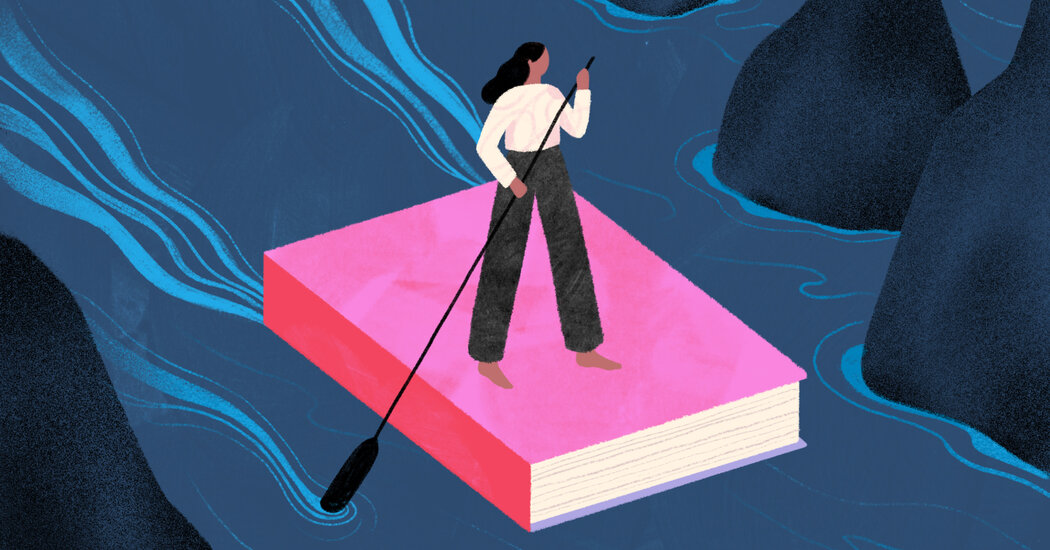Of the thousands of self-help books on the market, which ones are truly helpful? “It’s uncommon to find a self-help book that feels different,” said Vienna Pharaon, a marriage and family therapist in New York City.
But genuinely useful titles abound. The best of the genre invite reflection or offer practical tools to promote emotional, psychological or spiritual well-being. And there are some that therapists personally turn to or suggest to their patients.
“Almost every therapist I know has a whole list of self-help books to recommend,” said Daniel Tomasulo, a counseling psychologist and the academic director of the Spirituality Mind Body Institute at Teachers College, Columbia University.
When sorting through the self-help stacks, who better to help than mental health professionals? We asked seven to share their picks.
How do we experience joy in the face of personal and collective suffering? The Dalai Lama and Desmond Tutu spent five days reflecting on their own lives to answer that question, and they compiled their stories and guidance in this 2016 book.
“The Book of Joy” is an opportunity to learn from two spiritual leaders in an intimate, accessible way, said Sona Dimidjian, director of the Renée Crown Wellness Institute at the University of Colorado Boulder.
Through their dialogue, which is punctuated with laughter and tears, the Dalai Lama and Archbishop Tutu teach readers how to cultivate joy and work through difficulties like illness and despair. Dr. Dimidjian recommends the book to “anyone who is feeling overwhelmed by the realities of our world and daily life today,” she said.
This book, first published in 2007, teaches you to accept your negative thoughts and feelings as they arise, instead of resisting or being consumed by them — a refreshing approach known as acceptance and commitment therapy.
Diana Garcia, a South Florida-based therapist, says this easy-to-read primer made her “first fall in love” with ACT. She has clients use the book as a supplement to their sessions and recommends it to friends who are feeling stuck. It teaches you how to keep taking actions that move you in a positive direction regardless of how you’re feeling, she explained.
Gregory Boyle is a Jesuit priest who founded Homeboy Industries, a rehabilitation and re-entry program for former gang members. His 2011 book is a collection of real, raw stories about people he worked with and the lessons we can all draw from their experiences.
“Each chapter reads like a Sunday sermon to be savored and meditated upon,” said Jacob Ham, director of the Center for Child Trauma and Resilience at the Icahn School of Medicine at Mount Sinai. While faith is woven throughout the book, Dr. Ham recommends the title to anyone who feels “that their traumas and all the ways they’ve coped with them have left them broken and unredeemable.”
This 1992 workbook from Julia Cameron, a teacher and author, is a 12-week guide to recovering your sense of childlike creativity. And it’s not just for artists and writers, said Britt Frank, a trauma specialist in Kansas.
“Of all of the books I have ever used with clients, this one has the most staying power,” she said. “Because everyone is creative, and creativity is medicine.”
For years, Ms. Frank has returned to the book’s tools — like the “morning pages,” a stream-of-consciousness journaling practice. And she uses “The Artist’s Way” when treating clients with issues like depression and addiction. But skimmers beware, Ms. Frank cautioned: “It’s not a book you read. It’s a book you work.”
Thema Bryant is a trauma therapist, ordained minister and professor who offers a “distinctive lens on health, hope and healing trauma,” said Ayanna Abrams, a psychologist in Atlanta.
Drawing on her clinical work, spirituality and personal recovery from trauma, Dr. Bryant shares stories, reflections and exercises in this 2022 title. She helps people believe in their capacity to heal, Dr. Abrams explained. Dr. Bryant also avoids the “gimmicky, bypassing or vague” language that so many self-help books lean on, she added.
This 2019 guide helps people recognize, honor and nurture their brightest qualities, Dr. Tomasulo said. The idea of cultivating your “character strengths” comes from positive psychology, which centers on promoting well-being, he explained. “It’s about moving from focusing on ‘what’s wrong’ to ‘what’s strong.’”
People who lean into their character strengths tend to be happier, Dr. Tomasulo said. This book, he explained, is a good pick for “people who are doing OK, but want to have more joy and well-being in their life.”
Carolyn Todd is a freelance health journalist who covers wellness, mental well-being and diabetes.







